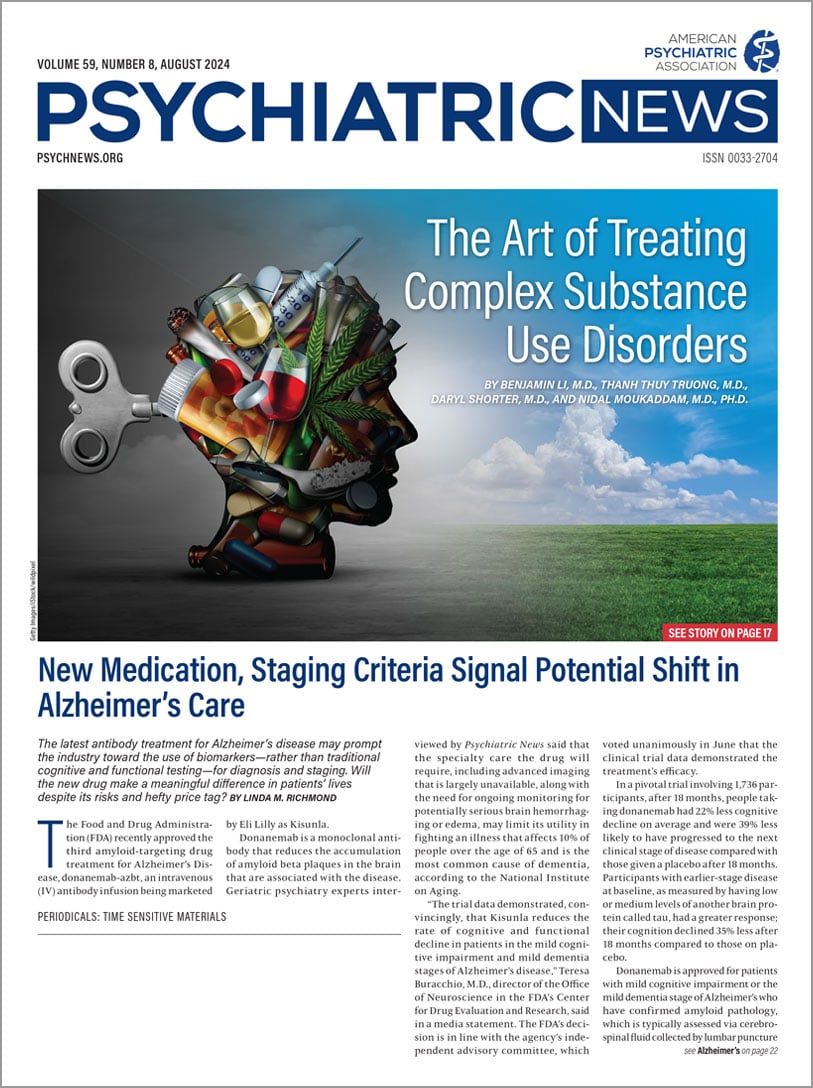Technological addictions such as addiction to video/internet games, cybersex, and online gambling have many of the same negative impacts on a person’s life as other addictions: They can harm a person’s relationships, work, and finances. As the 2024 Annual Meeting wound down, outgoing APA President Petros Levounis, M.D., M.A., capped his presidential theme with a presentation titled “Technological Addictions: The New Frontier in Addiction Medicine.” During the session, he outlined some of the parallels between technological addictions and substance use disorder (SUD) in terms of assessment, diagnosis, and treatment.
Levounis, professor and chair of psychiatry and associate dean for professional development at Rutgers New Jersey Medical School, first discussed how the use of technology can affect emotions and behaviors, focusing on gaming, cybersex, and online dating.
Many games are specifically designed to keep players in the “flow zone” that maintains a balance between the player's skills and the level of challenge in the game, Levounis said.
“If your skills are considerably higher than the challenge of the game, you get bored and you stop playing. If the challenge of the game is much higher than your skills, you can get anxious and stop playing,” he explained. “There is a sweet spot in between where your skills match the challenge of the game—the flow zone—and you keep on playing over and over and over again until you get addicted.”
The psychological concern with online pornography and cybersex is twofold, Levounis said. First, people who use online pornography or engage in cybersex may start comparing what they see on the screen with their experiences with their real-life partners, which can be detrimental to relationships. Second, people who use these technologies may come to feel that they cannot compete with what they see, which can damage their self-esteem and sense of themselves as a sexual human being, he explained.
Levounis added that online dating also has risks.
“Your life can become one of rejection, where you're constantly rejecting people and where you constantly get rejected, and only occasionally and somewhat unpredictably end up with a real [date],” Levounis said. The occasional date may be enough to keep users going back in the hope that they will have success the next time they log in, which in turn can foster excessive use, he explained.
Levounis said that technological addictions have several characteristics in common with SUDs, as follows:
•
Tolerance, such as needing to use technology increasingly more often to get the same mood-enhancing effect, and withdrawal, such as feeling anxiety or irritability upon stopping use of the technology abruptly.
•
Internal concerns, such as being preoccupied with the technology, being unable to cut down on using the technology when desired, and using the technology as a way of relieving negative moods.
•
External consequences, such as giving up other activities, jeopardizing relationships, or losing a job.
Treatments for technological addictions are similar to those used for other addictions, namely cognitive-behavioral therapy (CBT) and motivational interviewing, said Levounis.
Levounis said that CBT is better suited to patients who already recognize they have a problem and want to address it. “CBT does require some motivation. There’s a lot of structure and there’s homework.”
In contrast, motivational interviewing may work best early in the process, he said.
“Motivational interviewing does its best job with people in the precontemplation and contemplation stage of change,” Levounis said. “It can help people who are either highly ambivalent about their use or who think there is nothing wrong with what they’re doing.”
Levounis noted that there are currently no approved medications for any technological addiction, but there are a few potential options. He said that opioid antagonists such as naltrexone or nalmefene may help patients whose technological addiction is characterized by arousal and impulsivity. He added that these medications decrease dopamine function by blocking opioid receptors, which may reduce the “high” patients get from using the technology.
He added that serotonin enhancers like SSRIs may help patients whose technological addiction is characterized by problems with control or compulsivity because these medications may decrease obsessiveness.
Psychiatrists who treat patients with technological addictions should be sure to treat any co-occurring mental disorders aggressively, Levounis said.
“Do a very thorough diagnostic assessment. See if there are other psychiatric disorders for which we have robust pharmacological treatments and treat them in order to help the person both with the other psychiatric disorder and the technological addiction,” Levounis said. ■

